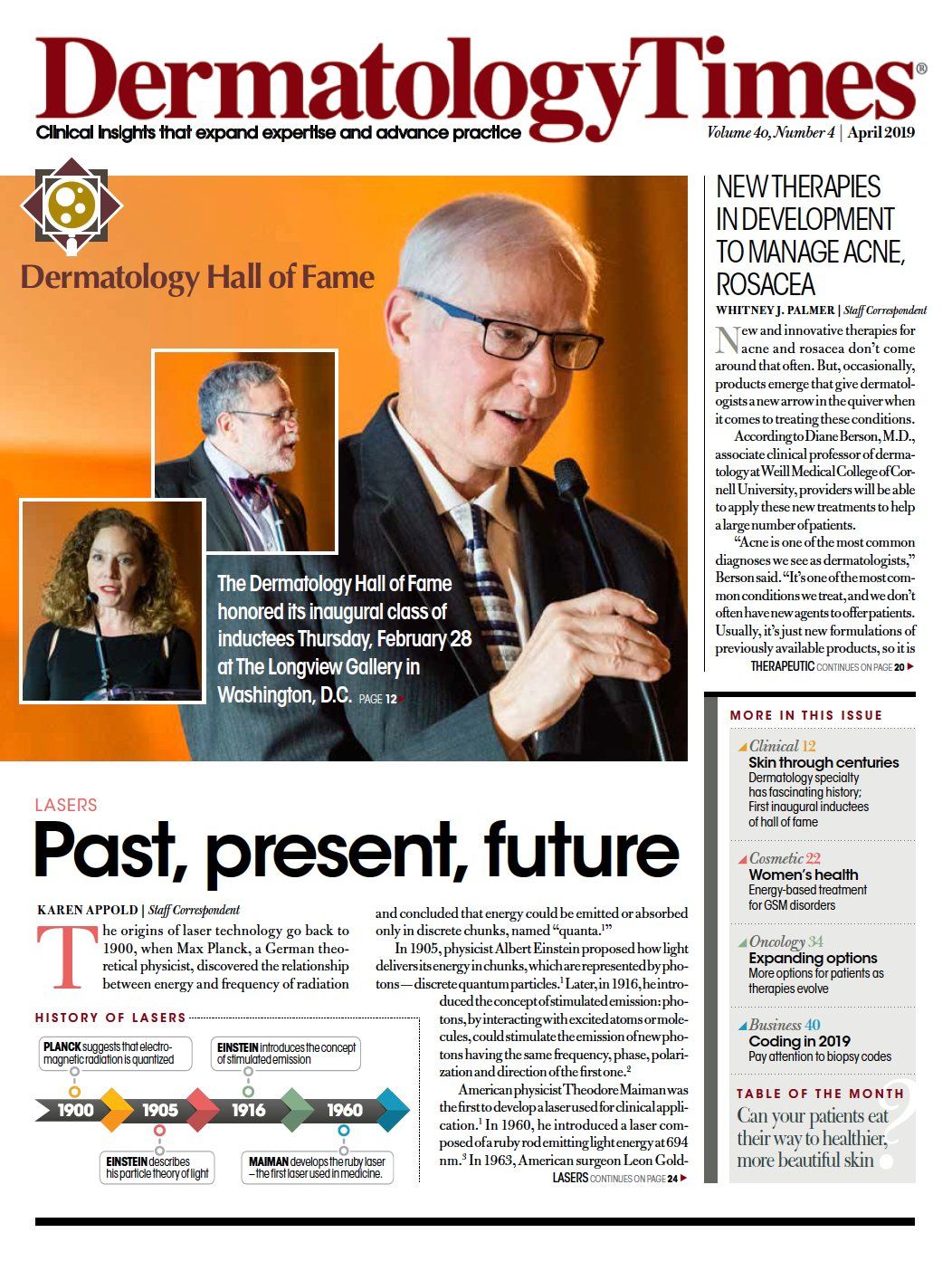- Case-Based Roundtable
- General Dermatology
- Eczema
- Chronic Hand Eczema
- Alopecia
- Aesthetics
- Vitiligo
- COVID-19
- Actinic Keratosis
- Precision Medicine and Biologics
- Rare Disease
- Wound Care
- Rosacea
- Psoriasis
- Psoriatic Arthritis
- Atopic Dermatitis
- Melasma
- NP and PA
- Skin Cancer
- Hidradenitis Suppurativa
- Drug Watch
- Pigmentary Disorders
- Acne
- Pediatric Dermatology
- Practice Management
- Prurigo Nodularis
- Buy-and-Bill
Publication
Article
Dermatology Times
Energy-based therapies for treating GSM disorders
Author(s):
Expert calls for FDA approval of devices for women’s genitourinary health: “Women need these treatments.”
Expert calls for FDA approval of devices for women’s genitourinary health: “Women need these treatments.” (©RudchenkoLilia/Shutterstock.com)

Dr. Alexiades

In her March 1 presentation at the 2019 American Academy of Dermatology’s Annual Meeting titled “Women's Genitourinary Health: Controversies,” Macrene Alexiades, M.D., Ph.D., associate clinical professor of dermatology, Yale University School of Medicine, New Haven, Conn., maintained that proper testing and clearances are needed to ensure the safe and effective use of fractionated and radiofrequency devices for treating genitourinary syndrome of menopause (GSM) disorders, which include atrophic vaginitis, urinary incontinence and pelvic prolapse. “Women’s health technologies shouldn’t be marketed for diagnoses that aren’t yet FDA approved,” she says.
Her remarks were made in light of the FDA’s November 2018 warning letter, which stated, “The use of energy-based devices to perform vaginal ‘rejuvenation’, cosmetic vaginal procedures, or non-surgical vaginal procedures to treat symptoms related to menopause, urinary incontinence, or sexual function may be associated with serious adverse events. The safety and effectiveness of energy-based devices for treatment of these conditions has not been established.”
Dr. Alexiades points out, however, that only 14 adverse events from such devices used on vaginal tissue have ever been reported to the FDA.1 “It is extremely rare to be burned by these technologies; this shouldn’t occur when used appropriately,” she says.
Nonetheless, Dr. Alexiades says she understands the FDA’s need to “pull back on the reigns” until these devices are FDA cleared for additional uses.
In addressing the issue of device safety and efficacy, Dr. Alexiades notes that lasers or energy-based devices have been used to ablate genitourinary (GU) tissue for more than 40 years and that they are FDA cleared for use in that capacity.
Currently, Dr. Alexiades and others in the field are working to attain FDA clearance to apply energy-based devices to treat GSM disorders - which affect up to 50% of women who are post-menopausal, post-oophorectomy, undergoing breast cancer treatment, post-radiation or breastfeeding.2
Also noteworthy is that energy-based devices are the fastest growing segment in the device industry for GSM treatments. Global sales for energy-based technologies exceeded $100 million in 2016. “The fee schedule is estimated to exceed $2 billion by 2021,” Dr. Alexiades says. “It is a tremendous area of growth in medical revenue.”
The bottom line, according to Dr. Alexiades, is that women need these treatments. “Their health has been neglected for generations,” she says. “Kegel exercises, the current treatment, aren’t effective; localized estrogen is moderately effective but hampered by a low compliance rate; hormone replacement therapy after menopause is associated with increased breast cancer rates; and surgical approaches, such as slings and meshes, are complicated by mesh erosions and consequent class-action lawsuits. It is absolutely necessary that we find alternative treatments to meet this prevalent health need.”
In randomized, controlled clinical trials3 comparing energy-based therapies to localized estrogen, the devices resulted in greater durability and longer-lasting outcomes. “Given the large body of evidence documenting that these devices improve vulvovaginal health and sexual function, we expect that FDA clearances will be forthcoming,” says Dr. Alexiades, who is currently finishing an FDA trial on fractional CO2 in postmenopausal women with GSM.
Dr. Alexiades is planning to request FDA approval this fall for energy-based delivery systems to be used to treat GSM conditions. “I urge others who have completed trials to do the same,” she says. “We will work with the FDA to do whatever is necessary to meet the rigor of safety and efficacy standards in order to attain their approval.”
Finally, Dr. Alexiades urges the regulatory body to be aware and cognizant that GSM is a female disorder. “Female physicians, scientists and overseers should be directly involved in the oversight of FDA clearances to control for any unconscious bias,” she says. “Only women who are suffering with these highly prevalent and life-altering conditions are able to fully comprehend the magnitude of their negative impact on quality of life.”
Dr. Alexiades’ lecture was part of the AAD 2019 session: “Advances in Lasers and Light Sources: What's the Truth?”
Dr. Alexiades is the founder and director of Dermatology & Laser Surgery Center of New York in New York, N.Y.; and CEO and founder of Dr. Macrene Skin Results 37 Actives.
References:
1. Alexiades M. Lasers and Energy-Based Devices for Women’s Genitourinary Health: Scientific and Clinical Evidence and FDA Clearance. J Drugs Dermatol. 2018 Nov 1;17(11):1155.
2. Portman DJ, Gass ML, Vulvovaginal Atrophy Terminology Consensus ConferencePanel. Genitourinary syndrome of menopause: New terminology for vulvovaginal atrophy from the International Society for the Study of Women’s Sexual Health and the North American Menopause Society. Menopause. 2014;21(10):1063-1068. doi:10.1097/GME.0000000000000329.
3. Gaspar A, Brandi H, Gomez V, Luque D. Efficacy of Erbium:YAG laser treatment compared to topical estriol treatment for symptoms of genitourinary syndrome of menopause. Lasers Surg Med. 2017 Feb;49(2):160-168. doi: 10.1002/lsm.22569. Epub 2016 Aug 22.






